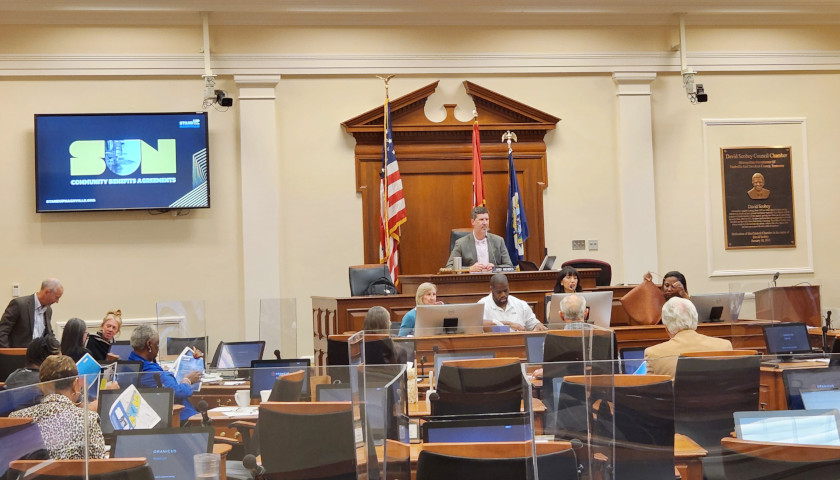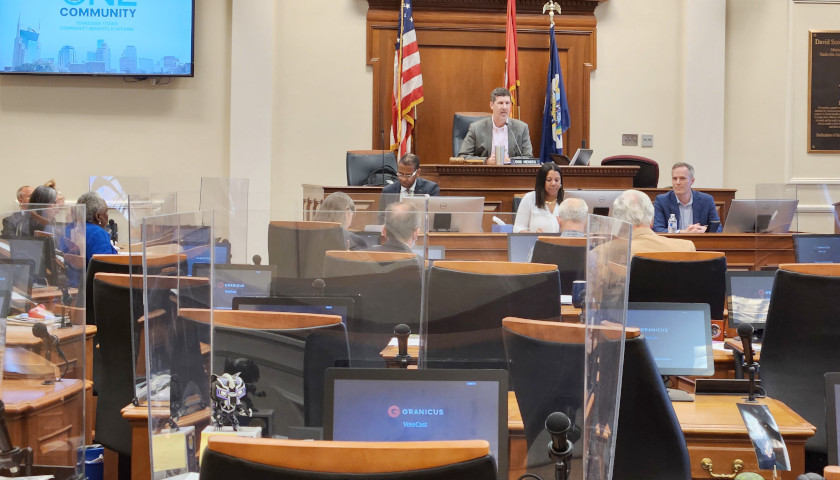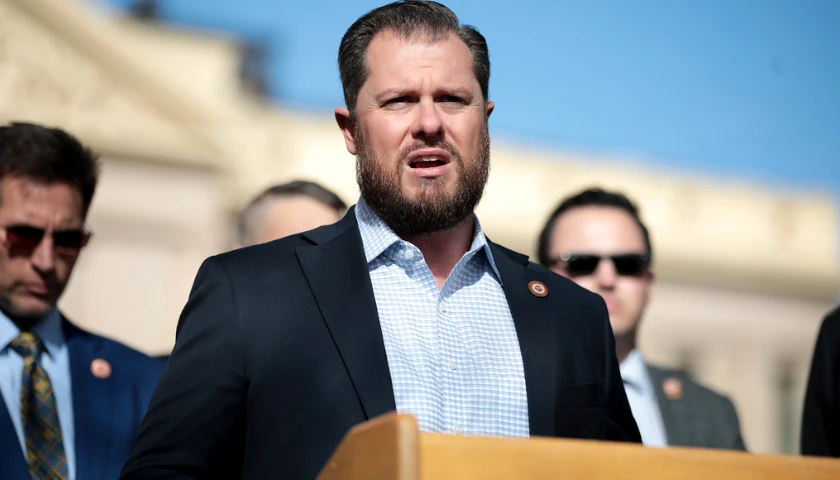NASHVILLE, Tennessee – At the Wednesday meeting of Metro Council’s specially formed East Bank Stadium Committee, members heard from the Tennessee Titans promoting their recently introduced community benefits platform and an advocacy group that recommended formal agreements for the communities that are to be served.
The Titans announced their ONE Community benefits platform just days after the joint announcement with Mayor John Cooper that the parties reached an agreement for a new football stadium.
 The team’s ONE Community platform focuses on three areas – Opportunity, Neighborhoods and Education – includes 16 binding commitments and will be in partnership with 16 regional organizations.
The team’s ONE Community platform focuses on three areas – Opportunity, Neighborhoods and Education – includes 16 binding commitments and will be in partnership with 16 regional organizations.
The original announcement was made at Tennessee State University, the Titans’ long-standing partner.
The announcement was made by Nashville natives Adolpho Birch, senior vice president and chief legal officer for the Titans, as well as Johari Matthews in the recently established role of director of programs for the Titans and the organization’s president and CEO Burke Nihill.
Matthews was formerly the executive director of the Northwest Family YMCA and served on the board of Corner to Corner, a partner in the ONE Community platform.
To about 10 council members, including most of the East Bank Stadium Committee and Chair Bob Mendes, and in front of about 30 attendees in the audience, including several from the Titans organization, the three representatives reviewed the ONE Community platform.
Birch did the introduction, and the heavy lifting during the meeting came from Matthews, who handled most of the slide presentation. After about 30 minutes, Nihill wrapped up, explaining the genesis of and expressing pride in the program.
“It’s been a lot of work. It’s been a lot of listening. This is something that’s quite literally, missional for us,” said Nihill before going into the history of the Titans’ mission statement developed two to three years prior.
From 85 words, the mission statement was pared down to reflect the consistent theme across the organization that the Tennessee Titans exist to win, to serve, and to entertain, Nihill explained.
“With service being, quite literally, in the center of our mission and our purpose as an organization,” Nihill said, they recognized that they needed to serve well, which drove the ONE Community process and that Birch and Matthews are an indication of the organization’s seriousness about serving this community well.
Upon Nihill’s conclusion, Mendes said they had 15 minutes remaining in the block reserved for this presentation, but with few questions from council members, the segment finished about 10 minutes early.
As the community advocate panel came forward to review CBAs in the contest of the stadium and East Bank development, Mendes thanked them for their flexibility for being shuffled into the middle of the meeting.
The panel introduced themselves as Maura-Lee Albert, who works for SEIU (Service Employees International Union) and is Chair of Stand Up Nashville (SUN); Tamika White, Director of Programs and Special Projects, Equity Alliance; Kay Bowers, NOAH’s (Nashville Organizing for Action and Hope) Affordable Housing Task Force; and Nathaniel Carter, Director of Workforce and Employment, Stand Up Nashville.
SUN came together several years ago, explained Albert, when they wanted to make sure development “happened with Nashville and not to Nashville.” Collectively, their seven organizations represent tens of thousands of people who live in Davidson County, Albert said. SUN counts among its accomplishments “a Moral Budget” in 2020, “that funds our schools, builds our infrastructure and invests in our people,” as it also called for defunding Metro police.
As with the CBA related to the soccer stadium, elected officials were not invited to the negotiating table, which would not be proper; they are not being asked now, said Albert.
“What we’re asking is you lead with your morals, which is how it got you here to represent your constituents, what is best for the city of Nashville. That is really what we want to see as we go forward with this.”
Bowers started a slide presentation regarding CBAs, saying that the movement is centered on the belief that private and public sector investment and economic development in communities “should bring “measurable permanent improvement to the lives of our residents, particularly low-income residents and communities of color through good jobs, affordable housing and neighborhood services.”
White reviewed the history of the 12-page CBA related to the soccer stadium, the only known agreement of its type in Nashville, which was signed in 2018 between Sun and Nashville Soccer Holdings, LLC.
Carter, who managed the Music City Construction Careers program that connects men and women of all ages and experience levels with quality careers in skilled trades and spearheaded the first source hiring program that came out of the Nashville Soccer Holdings CBA, talked about his experience in helping people get quality jobs.
Before going into those details, Carter reminded committee members that Oracle, a company that Nashville made a huge deal with last year, laid off an untold number of employees last week, including many who just recently relocated to Nashville.
“Companies make promises to make good press and get good tax breaks. They also break promises all the time. Nobody bats an eye. They’re companies; they have a bottom line. That’s what they all do, but that’s the exact reason why we care about CBAs. CBAs hold private companies accountable for the promises they make to their communities.”
Albert expressed concern, relative to the Titans community benefits platform that meetings were happening and SUN representing tens of thousands of people across Nashville, haven’t been invited to any of them and questioned if the meetings are being publicly noticed and if they are being shared widely, particularly with the communities most impacted.
In a question-and answer-exchange with committee member Kyontze Toombs (District 2) about the community meetings, White said that the Titans meetings were held during the day so that working people could not attend, a lot of the people in attendance were not those who live in the East Bank, or get direct benefits from the East Bank. If it hadn’t been for her line of work and interest in seeing who else she might know at the meetings, White said she would not have attended and when she did there were no “regular people” from the community in the meetings they attended.
White said, as Albert chucked in apparent agreement, that the meetings should be held as council members do – after hours at 6 p.m. so working-class people could attend and voice their opinions.
“I think it’s difficult when you want to have community engagement, name it that, and then charge $75 for a ticket for someone to get in to see what this beautiful PowerPoint is you’re about to present to people. It was held at 7:30 in the morning. We’re getting our kids ready for school at 7:30 in the morning, right?” White told Toombs with obvious familiarity between the two.
“So, I think the meetings are not convenient for people who are directly impacted by this project, and we have to go back to the drawing board, and I think that’s not a bad thing and it definitely does not have to be rushed,” White concluded.
At the request of Mendes, Metro Council Director Margaret Darby also gave an update from a governmental perspective as to community benefits agreements (CBA), which she described as generally being private and between a developer and a community group or a coalition of community groups that agrees to forego opposition of a project in exchange for local benefits such as local jobs, affordable housing or wage requirements.
CBAs are “relatively novel” in Nashville, advised Darby, with only one to her knowledge that was related to the soccer stadium. Many of the terms desirable in CBAs, are necessarily, prohibited by state law when it comes to locally legislating private entities in matters such as regulating or conditioning zoning to below-market housing rents and sales of private property as affordable housing or requiring certain anti-discrimination policies, health insurance benefits to employees, membership in unions, private contractors hiring employees within certain income ranges or locales or minimum wages, if contradicted by state or federal law.
After nearly two hours, Mendes observed that there were only about five or six of them remaining for the scheduled 15-minute discussion period, which was quite a few less than the previous meeting when the mayor’s staff attended to address questions regarding the stadium term sheet.
Mendes asked committee members if there were any blind spots that they should be learning about.
Council member Sean Parker (District 5) was the only one who responded, but addressed information that is glaringly still not available to the council.
“I think that the two biggest questions for me at this point in the process are what are Metro’s obligations under the existing lease and then what is the cost of construction of a new stadium and of maintaining it for the life of the new lease. I think those are the two really big data points that we need to be able to approach this proposal and weigh the merits of this proposal and we still don’t have those. And I think at every meeting that we have here, I’m going to make a point of highlighting the fact that we still don’t have that information, which I think is pretty fundamental to any consideration this body can take,” Parker declared.
Mendes advised that, if he hadn’t done it already, Parker should formally submit those two questions to the council office. As he previously advised, Mendes said that the questions will be submitted to the administration, with the expectation that the council’s questions will be answered on a weekly basis and then posted to the committee’s website.
However, the answers that the administration has provided was last updated on September 14, which is more than seven weeks ago and before the stadium term sheet was published.
The video of the November 2 meeting of the East Bank Stadium Committee can be watched here.
The next meeting of the East Bank Stadium Committee is scheduled for 4:30 p.m. on Monday when the VSG (Venue Solutions Group) will present the Nissan Stadium Facility Assessment.
– – –
Laura Baigert is a senior reporter at The Star News Network, where she covers stories for The Tennessee Star.








